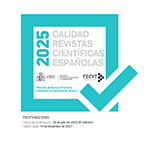Beyond the margins: rethinking the ethical-political role of the "offscreen" in the audio-visual journalistic narrative
Abstract
This article analyzes the possibility of finding compositional characteristics in a particular audiovisual language tool, the “offscreen”, that could favor the production of journalistic narratives in which the ethical-political aspect of what is represented is prioritized over the aesthetic one. These characteristics are especially relevant in a context in which the post-truth paradigm in the mass media seems to have come to stay. To do this, first, I will analyze the definition that the documentary filmmaker and thinker, Jean-Louis Comolli, makes of the offscreen and, secondly, I will exemplify it through the narrative and compositional strategies of Agarrando pueblo (1978), documentary made by Carlos Mayolo and Luis Ospina.
Downloads
Article download
License
In order to support the global exchange of knowledge, the journal Estudios sobre el Mensaje Periodístico is allowing unrestricted access to its content as from its publication in this electronic edition, and as such it is an open-access journal. The originals published in this journal are the property of the Complutense University of Madrid and any reproduction thereof in full or in part must cite the source. All content is distributed under a Creative Commons Attribution 4.0 use and distribution licence (CC BY 4.0). This circumstance must be expressly stated in these terms where necessary. You can view the summary and the complete legal text of the licence.










